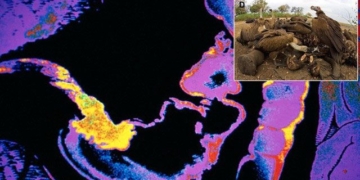After contracting Covid-19, 44-year-old Ms. Lien struggled with vocabulary, frequently encountering difficulties in finding the right words or mistakenly naming objects, such as confusing “scissors” with “knife”.
Not long after recovering from Covid-19, Ms. Lien often experienced headaches, insomnia, feelings of confusion, and memory loss, as she couldn’t remember the names or locations of common items. At times, she even forgot things she had previously done or the names of her loved ones. When reading, there were segments she did not understand. Subsequently, she began facing challenges in communication as she could not express her thoughts clearly, and cooking became more time-consuming as she could not concentrate as she used to.
Her mood also changed, frequently feeling discouraged or anxious, with a racing heart. She became easily irritated as her memory decline disrupted her daily life. “I feel like an old person,” she told her doctor.
Dr. Nguyen Huy Hoang, a specialist in treating autonomic nervous system disorders at the Vietnam-Russia High-Pressure Oxygen Center under the Ministry of Defense, who directly consulted on this case, noted that the patient was experiencing “brain fog,” one of the aftereffects of Covid-19. “Brain fog” refers to symptoms related to cerebral hypoperfusion and autonomic nervous system disorders that affect thinking and memory. Those affected may feel mentally foggy, struggle to concentrate, take longer to remember someone’s name, or frequently forget what they intended to do…
Dr. Hoang is also treating Mrs. Nhung, a 67-year-old patient with a history of hypertension, who is also experiencing “brain fog” as a post-Covid-19 complication. After recovering from Covid-19, she tried to do household chores but suffered from persistent pain and fatigue. During many conversations, she often had to pause because she couldn’t figure out how to continue, repeating her words multiple times. The patient frequently placed objects in unfamiliar locations, losing items she could not find again.
On average, Dr. Hoang receives 50-60 calls related to Covid-19 each day, with 15-20% of those being patients experiencing “brain fog.” This phenomenon occurs in both older and younger individuals, in both severe and mild cases, and often appears either during Covid-19 infection or a few days after recovery.

Doctors treating and caring for patients at the Covid-19 Intensive Care Center in Ho Chi Minh City Oncology Hospital (Thu Duc City), September 2021. (Photo: Quynh Tran)
“Brain fog” remains a mystery to the medical community due to the diverse range of symptoms. The condition of “brain fog” after Covid seems to be common among middle-aged patients with underlying conditions such as diabetes and hypertension.
Dr. Hoang stated that in addition to common symptoms like decreased concentration, diminished clarity while working, and memory loss, the condition is associated with many systemic symptoms and not just one part of the body, such as rapid heartbeat, anxiety, occasional shortness of breath, spasms, and tremors in the limbs. Some symptoms of “brain fog” include headaches, dizziness, insomnia, psychological disturbances, sensory disorders, and movement disorders like finger tremors…
The causes of “brain fog” may relate to the invasion of virus into nervous tissue and widespread inflammation (including the nervous system) as a consequence of Covid. “Brain fog” is also thought to be due to anxiety and stress, leading to poor sleep and eating habits, affecting mood and behavior. Furthermore, during infection, blood vessels, especially small ones, can be damaged post-Covid-19, impairing blood circulation to the brain, thereby exacerbating the condition of “brain fog.”
In severe patients, oxygen deficiency can affect brain tissue, leading to the aftereffect of “brain fog.” Additionally, other causes may include side effects from sedatives or medications used in the intensive care treatment of severe patients.
Some studies worldwide suggest that after a Covid-19 infection, individuals’ immune responses continue to be activated persistently, which can cause inflammation in blood vessels or cells. Released inflammatory molecules can become toxic, particularly to the brain, resulting in the phenomenon of “brain fog.” Another hypothesis proposed is an autoimmune condition, where antibodies mistakenly attack nerve cells. Symptoms such as numbness or tingling in the limbs may occur when nerves are damaged, sending incorrect signals to the brain. Some individuals with “brain fog” still experience heart and lung issues, further exacerbating neurological symptoms.
The condition of “brain fog” is expected to gradually improve over a few months but can recur when triggered by stress or excessive stimuli. Patients are advised to engage in light exercise to relieve mental stress, play games like crosswords, or listen to music to stimulate cognitive function, and consume foods rich in Omega-3 and antioxidants to alleviate “brain fog.” Dr. Hoang recommends that those experiencing “brain fog” seek early medical consultation to rule out other medical conditions and address neurological issues. The most effective way to mitigate the impact of Covid-19 remains vaccination and adherence to health guidelines.
* Names of characters have been changed



















































